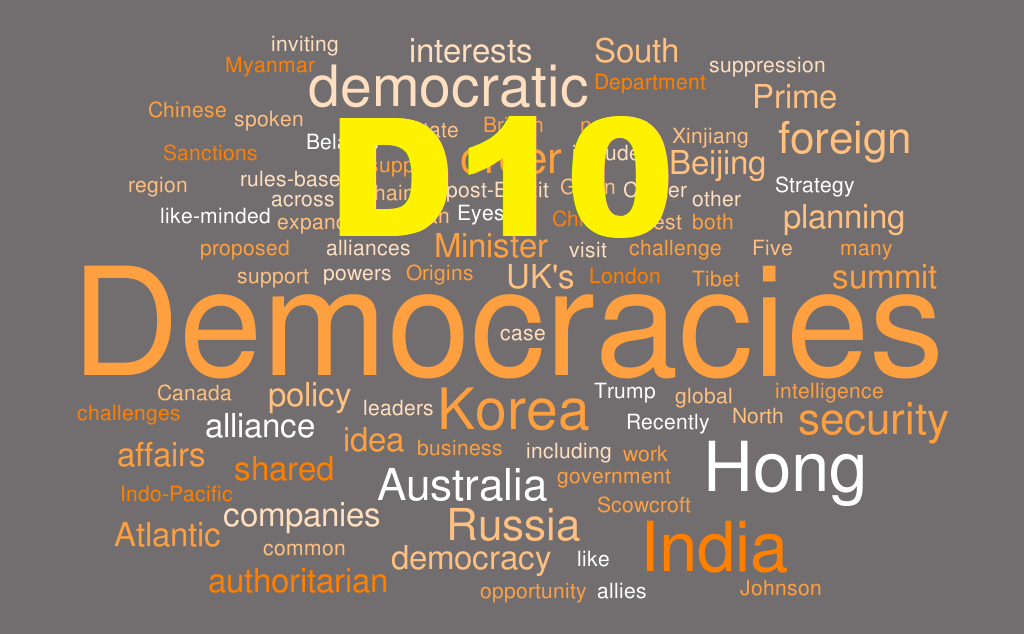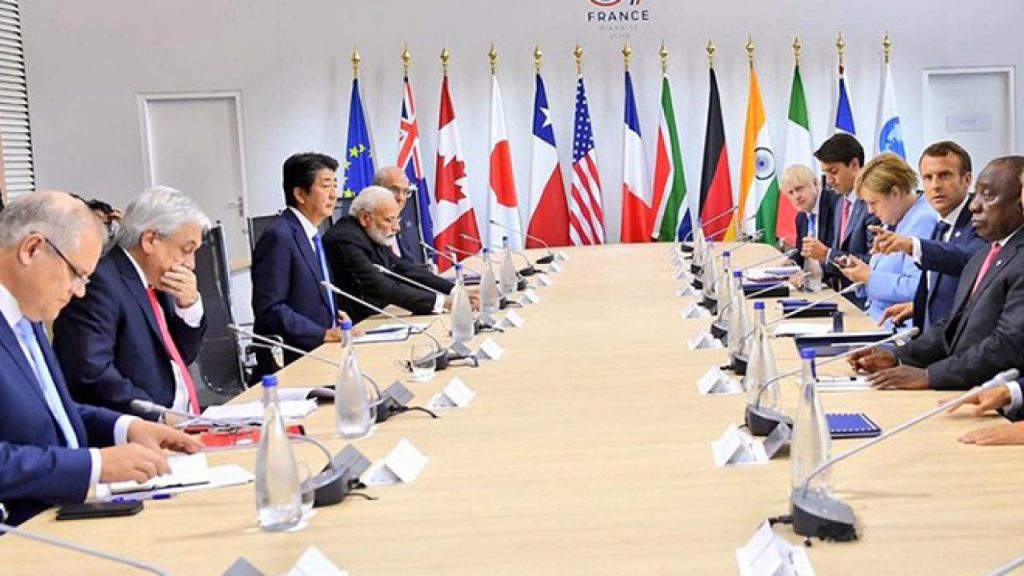
Summary: The G7 group of leading industrialised nations have been experimenting with the idea of broadening the group by including 10 leading democracies capable of challenging China and other authoritarian states. With China ‘wolf warrior’ diplomacy threatening countries and economies, it becoming a threat to democracies and its continued repression of people in Tibet, Hong Kong and Xinjiang regions, the democracies of India, South Korea and Australia, were natural members of the proposed group.
While D10 has the task of ensuring that democratic forces prevail over authoritarian powers, it has to make business and economic sense to the member countries in order to sustain itself and make a pragmatic case for its existence. The D10 provides an opportunity for channelling investments into existing telecommunication companies within the 10 member states and moving away from their dependence of Chinese technology and equipment given the security concerns. Furthermore, the experience of COVID19 has made the case for an alliance of trans-Atlantic and trans-Pacific democratic countries stronger than ever.
UK Prime Minister Boris Johnson will be visiting India in January 2010 as a guest of honour on India’s Republic day. His visit is expected to deepen UK-India relations. Given the fact that the UK is seeking new alliances post-Brexit, its tilt to the Indo-Pacific was a foregone conclusion. With China ‘wolf warrior’ diplomacy threatening countries and economies, it becoming a threat to democracies and its continued repression of people in Tibet, Hong Kong and Xinjiang regions, India was the UK’s natural ally in the region.
Johnson while accepting the invite had said: “As a key player in the Indo-Pacific region, India is an increasingly indispensable partner for the United Kingdom as we work to boost jobs and growth, confront shared threats to our security and protect our planet”, clearly indicating his preferences on the tour. The UK has officially invited the Indian Prime Minister Narendra Modi to attend the UK’s G7 summit next summer as one of three guest nations alongside South Korea and Australia. This follows the UK PM’s “ambition to work with a group of like-minded democracies to advance shared interests and tackle common challenges”.
US President Trump has on many occasions said that as China asserts its influence across the globe, it poses a serious challenge to a rules-based, democratic order. Hence, the US and other leading democracies have to coordinate a strategic response to counter the China challenge he has said. In June this year, Trump had proposed inviting India, South Korea, Australia, and Russia to join a rescheduled G7 summit in September. However, including Russia in this group of leading democracies was a nonstarter—especially since the G-20 already exists as a separate, broader grouping that includes both Russia and China.
US President-elect Joe Biden has also said that he plans to hold a summit of democracies. However, none of them have categorically spoken about the formation of a formal group of democratic countries or the shaping of a “D10” though most leaders have spoken to this effect. So, can D10 become a reality?
Origins of the D10
The G7 group of leading industrialised nations have been experimenting with the idea of broadening the group by including 10 leading democracies capable of challenging China and other authoritarian states.
The “D-10” construct has its origins in a US State Department policy planning staff initiative launched in 2008, which convened policy planning directors from US allies across the Atlantic and Pacific for a strategic dialogue on global challenges. Subsequently, Atlantic Council Senior Fellow Ash Jain and former State Department policy planning director David Gordon suggested that the D-10 could serve as a standing platform for strategic collaboration that would allow the U.S. and it’s like-minded allies to advance common interests and shared values.
The first D-10 Strategy Forum meeting was held in Ottawa in 2014. Recently, Atlantic Council’s Scowcroft Center for Strategy and Security proposed that the G7 should be expanded to include Australia, South Korea, and India, serving as a D-10 steering committee of democracies to advance a rules-based order. The G7 today includes the UK, the US, France, Japan, Germany, Italy and Canada.

The UK is the prime mover of the group given its own interest in forging alliances to tide over the post-Brexit scenarios. On October 15, The Guardian published an article discussing the future of the US-UK relationship after the November election. The article highlights support among leaders in Washington and London for a D10 of leading democracies.
The article states that “the importance of alliances as a route to leverage is at heart of Biden’s support for a D10, an expanded G7 of democracies – an idea that was first developed by Washington’s Scowcroft Center in 2014 and is now frequently mentioned by Dominic Raab, the UK foreign secretary, as a possible new intelligence network”.
Formalising the D10
The UK has been actively considering the idea to consolidate the D-10 group of 10 leading democracies for addressing both 5G mobile communications and vulnerable supply chains when more countries fear inviting Chinese companies like Huawei and ZTE or use its equipment in view of the security risks. UK, US, many countries in Europe, Japan have already banned Chinese companies from participating in 5G trials.
Apart from business interests, Britain is leading the effort which is in line with its policies over Hong Kong. As China used martial and legal methods to quash pro-Democracy uprising in the island nation, Britain openly criticised the Communist country for falling back on its 1995 agreement of guaranteeing autonomy to Hong Kong. Recently London offered to provide open-ended residency and a pathway to citizenship to over 2.5 million Hong Kong citizens after Beijing imposed the regressive national security law it passed on the city.
The Five Eyes intelligence sharing group comprising foreign ministers from the UK, US, Australia, Canada and New Zealand said China’s imposition of new rules to disqualify elected legislators in Hong Kong appeared to be part of a campaign to silence critics and called on Beijing to reverse course. China’s ministry of foreign affairs in Hong Kong said any attempt by foreign states to threaten or pressure Beijing to make concessions is “doomed to fail”, while its external affairs minister chillingly said that the Five Eyes will be ‘blinded’ if they try to meddle with its ‘internal affairs’.
The western powers have also called out China for its treatment of residents in Xinjiang and Tibet. The G7 have also reprimanded countries like North Korea, Belarus, Myanmar for suppression of democracy. The UK government has in fact inserted provisions into it’s new UK Sanctions Act, which subject individuals from Saudi Arabia, Russia, Myanmar and North Korea to targeted sanctions. The UK was one of the first to sanction officials in the Belarus government over the suppression of democracy campaigners following the disputed elections.
While D10 has the task of ensuring that democratic forces prevail over authoritarian powers, it has to make business and economic sense to the member countries in order to sustain itself and make a pragmatic case for its existence. The D10 provides an opportunity for channelling investments into existing telecommunication companies within the 10 member states. Such a democratic group is a great opportunity for the large democracies to solve their differences, avoid slipping towards protectionism and promote more diverse global supply chains in critical areas while also building new capacities for sourcing components and shifting certain production to outside of China in a coordinated fashion.
The visit of the UK’s PM to India cannot come at a better time for the democracies of the world. The experience of COVID19 has made the case for an alliance of trans-Atlantic and trans-Pacific democratic countries stronger than ever. The major democracies have to quickly build an action-oriented D-10 focusing on mutually agreeable core issues and not just remain as a talking point in order to stay relevant.
